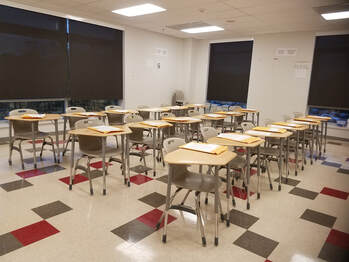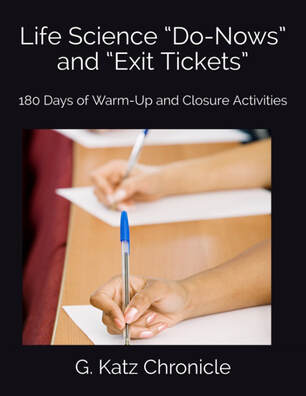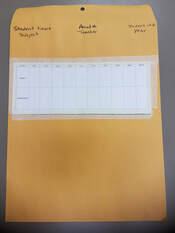|
1/13/2020  There are several classroom elements that help establish and maintain a productive learning environment. Most importantly, teachers must present a calm, assertive demeanor. The other elements, which I will discuss below, are a part of "proper prior planning". Effective planning helps to keep students engaged in purposeful work and behaviorally appropriate. Read on or watch my Youtube video below to see how I manage student behavior in my high school biology classroom:  Before students enter the classroom, I place their classroom folders and "do-nows" on their desks. During the opening week of school I taught them my expectation that they enter the room quietly and begin guessing words based on the context of the science article, their "do-now". As students are seated, making their guesses, I paraphrase the article to assist them in guessing appropriate words. I tailor the amount of my guidance to the capabilities of the learners in my class. After about five minutes of independent work I lead the class in a discussion of what words work best in the article.  The "do-now" activity takes about ten minutes, during which I also complete "housekeeping" tasks like attendance. After, students complete the day's lesson, which may be a lab, notes, or other assignment. During the last five minutes of class, I project a sentence starter on the board. Students complete the sentence starter on the back of their "do-now". The completed sentence is the student's "exit ticket" as they leave class. An example of a typical sentence starter is, "The main idea of today's class was….". Both the "do-now" and exit ticket activities promote academic engagement from bell to bell. The completed activities are collected daily and grouped by student name. I make daily notations, as appropriate, on the "do-now" regarding individual student behavior and work habits.  On the last day of the week I review the students clipped "do-nows", a set of five in a typical week. I assign a fractional grade based on my evaluation of their class participation for the week as evidenced by their work on their "do-nows" and the notations about their behavior and work habits. A student exhibiting exemplary behavior and work habits would earn 5/5, or if fewer days in the week, a fractional amount equalling 100%. Whatever the student's fractional score, that number is entered in my gradebook as the week's participation grade. Students generally get ten participation grades a quarter, though sometimes short weeks are combined. Student's participation grades are calculated with assignments, and cumulatively, are worth 45% of their biology grade.
 Like many teachers, I work with students with diverse abilities, some with very limited reading skills. Some of my students also make choices and exhibit behaviors that further hinder their abilities to learn. I started using abridged, edited science articles in my classroom several years ago as a way to acclimate students to developing an academic focus the moment they entered my classroom. I found the science article do-nows to be a useful practice, so I edited five articles each week to use in my classes. In subsequent years I organized them by science topic so that students could read about research from the field we were currently studying. My collection includes 180 articles covering the ten biology topics I teach. Those do-now articles, along with exit ticket sentence starters are available in my book Life Science "Do Nows" & "Exit Tickets"Life Science "Do-Nows" and "Exit Tickets": 180 Days of Warm Up and Closure Activities. Buy your copy here or on Amazon.  If you do, you'll be following through with the "7 Ps"!
2 Comments
9/22/2023 09:59:07 pm
Great post much appreciate the time you took to write this
Reply
Gertrude Katz Chronicle (G. Katz Chroncile)
9/23/2023 10:03:30 am
I'm glad you found it helpful.
Reply
Leave a Reply. |
AuthorGertrude Katz has spent over 30 years teaching K-12 public school students all major subjects. She has taught biology and education at the college level. The majority of her career has been spent instructing biology at the secondary level. Categories
All
|


 RSS Feed
RSS Feed